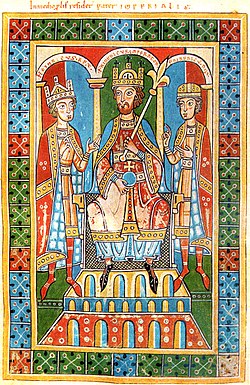 Friedrich Barbarossa, Holy Roman Emperor | |
| Pronunciation | German: [ˈfʁiːdʁɪç] |
|---|---|
| Gender | male |
| Origin | |
| Meaning | peaceful ruler |
| Other names | |
| Related names | Frederick, Fredrik, Federico, Frederik, ... |
Friedrich is a German given name and the origin of the English Frederick. People with the name include: